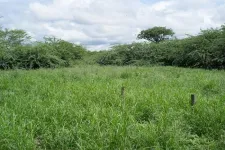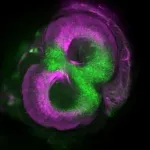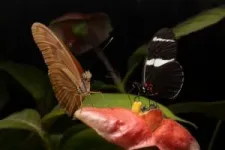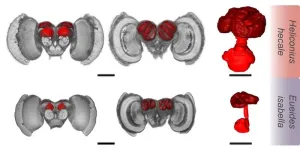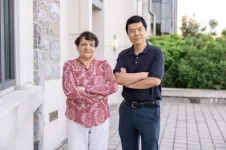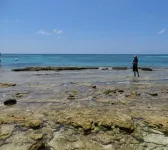(Press-News.org) A team of scientists led by CABI have conducted a new study which shows that three ways to fight the invasive Prosopis juliflora tree in Ethiopia, Kenya and Tanzania all proved very effective in almost all cases.
The three-year research, published in the journal CABI Agriculture and Bioscience, revealed that cut stump and basal bark herbicide application and manual uprooting were highly effective, killing the trees in between 85-100% of cases.
In addition, three incremental restoration interventions were tested as part of the study, which took place in Ethiopia’s Afar National Regional State, Kenya’s Baringo County and Tanzania’s Moshi District, that included divots, divots and mulching, divots and mulching and grass seed sowing.
The scientists found that the two treatments that involved the complete removal of the aboveground biomass (manual removal and cut stump) yielded a more productive and more diverse vegetation that the treatment that killed the trees standing (basal bark).
Prosopis juliflora is considered one of the world’s most threatening non-native tree species. Though it was introduced to Eastern Africa in the 1970s to provide wood and fodder and reduce erosion on degraded land, it has since spread rapidly with a range of severe impacts.
These include loss of grazing land, loss of access to water, declining biodiversity, reduced human health, increased human-wildlife and human-human conflicts.
In Ethiopia’s Afar region, prosopis invaded 1.2 million hectares of land since its introduction in 1990. A previous study by Shiferaw et al, for instance, provided evidence that the alien tree – which has invaded both the floodplains of the Awash River and the surrounding dryland habitats – uses excessive amounts of water by consuming approximately 3.1-3.3 billion m3/yr of water throughout the year in the Afar Region.
Dr Rene Eschen, lead author of the study and Senior Scientist, Ecosystems Management, based at CABI’s centre in Switzerland, said that compared to the effect of prosopis removal, the effect of restoration interventions on vegetation composition was small, suggesting that most species re-established from the soil seed bank.
“The results show that it is possible to restore land previously invaded by prosopis. Despite the different rates of vegetation establishment and variation in species composition, the restoration interventions resulted in vegetation that in some cases contained a substantial fraction of perennial grasses,” he said. “The method chosen to control prosopis depends on the availability of resources, including herbicides, and the need to remove rootstocks if the intention is to plant crops.”
The scientists argue that their research demonstrates how combined prosopis management and restoration interventions can result in grassland vegetation within a few years, therefore, reversing some of the impacts of prosopis and providing livelihood support.
They stress that the results further show that the cost – including time investment – and subsequent vegetation development differ among the method employed for killing prosopis trees.
The researchers also add that the choice for one method over another depends on a combination of available resources, sizes of the target trees, available manpower and the intended land use following prosopis management.
Dr John Richard Mbwambo, of the Tanzanian Forestry Research Institute, added, “Most of the restoration practices did not have significant impact on the species re-establishment and further studies are needed to determine whether the initial investment in prosopis treatment is offset by economic benefits provided by grassland established following removal of prosopis.
“Yet, these results indicate that significant livelihood benefits may be obtained as a result of the increased availability of fodder.”
CABI have been assessing water use of prosopis and its impacts on catchment water budget and rural livelihoods in the dry Afar Region of Ethiopia, since 2015 as part of a long-term collaboration in the framework of the CABI-led Woody Weeds project.
A subsequent Swiss-Kenyan Woody Weeds + project was launched in 2019 to support a National Prosopis Strategy (NPS) for Kenya which is aimed at the sustainable management of the invasive weed Prosopis juliflora.
The Woody Weeds + project will support implementation of the NPS jointly with relevant stakeholders, in a target area stretching from West to East along the southern edge of Kenya’s northern rangelands, targeting areas in Baringo, Isiolo and Tana River counties.
This work also aligns with a project funded by the Darwin Initiative which is currently active in Tanzania and complements the National Invasive Species Strategy and Action Plan (NISSAP). This strategy aims at protecting Tanzania’s biodiversity, ecosystem services, and livelihood assets from invasive species and their negative impacts and the project supports management of the starting Prosopis juliflora invasion in the Lake Natron Basin.
Full paper reference
Eschen, R., Bekele, K., Jumanne, Y., Kibet, S., Makale, F., Mbwambo, J.R., Megersa, B., Mijay, M., Moyo, F., Munishi, L., Mwihomeke, M., Nunda, W., Nyangito, M., Witt, A., Schaffner, U., ‘Experimental prosopis management practices and grassland restoration in three Eastern African countries,’ CABI Agriculture and Bioscience, 13 July 2023, DOI: 10.1186/s43170-023-00163-5
The paper can be read in full open access here: https://doi.org/10.1186/s43170-023-00163-5
END
Three ways to fight invasive Prosopis juliflora tree in Eastern Africa all proved very effective, new study shows
A team of scientists led by CABI have conducted a new study which shows that three ways to fight the invasive Prosopis juliflora tree in Ethiopia, Kenya and Tanzania all proved very effective in almost all cases
2023-07-13
ELSE PRESS RELEASES FROM THIS DATE:
Poignant photo project reveals all we lost in lockdown
2023-07-13
Laptops and schoolwork on kitchen tables, a deserted playground, face masks on a washing line, an empty church, a walk in the woods.
As the UK Covid inquiry continues for a fifth week, researchers at the University of East Anglia have created a unique snapshot of lockdown life.
When the pandemic first hit, the team embarked on a project to track the physical and mental health of the nation. More than a thousand participants signed up and up and they were followed every day for three months in the first study of its kind.
As well as keeping daily lifestyle diaries about their physical activity, diet and mood, ...
Butterfly species’ big brains adapted giving them a survival edge, study finds
2023-07-13
Heliconius butterflies’ brains grew as they adopted a novel foraging behaviour, scientists at the University of Bristol have found.
A region of their brain, known as the mushroom body due to its shape, are two to four times larger than those of their close relatives.
The findings, published today in Nature Communications, suggest that the structure and function of the nervous system are closely linked to an organism's ecological niche and behaviour.
Dr Stephen Montgomery of Bristol’s School of Biological Sciences explained: “Heliconius are the only butterflies known to collect and digest pollen, which gives them an adult source ...
Combination cancer therapies can shrink tumors and improve survival outcomes for patients with advanced non-small lung cancer
2023-07-13
New Haven, Conn. — While pembrolizumab is an approved treatment for patients with stage III non-small cell lung cancer (NSCLC), only some patients respond to this therapy. Treatment failure, researchers say, is often caused by differences in the tumor microenvironment. An ongoing phase II study (KEYNOTE-495/KeyImPaCT) led by a researcher at Yale Cancer Center reveals that combining pembrolizumab with other treatments reduced the size of target tumors, resulting in a higher response rate for patients with advanced NSCLC.
The new research was published July 10 in Nature Medicine.
“We are excited to share these new ...
NSF CAREER award invests in the future of stable computing
2023-07-12
Every night, uncounted numbers of devices across the globe update their operating systems (OS), and everyday users log on expecting fast, secure connections and services to keep their increasingly online lives moving forward. But as artificial intelligence and other more complex systems come online, the foundation of all them is teetering.
Every aspect of society — from government and industry to education and entertainment — relies on devices with stable operating systems. And every OS relies on ...
Collaborative seed grants nurture high-impact social and environmental research
2023-07-12
The National Science Foundation, the National Institutes of Health, and the National Aeronautics and Space Administration have collectively awarded millions of dollars in grant funding to numerous Virginia Tech researchers who all have one thing in common.
They were awarded Emerging Social Aspects of Global Change seed funding.
Since 2015, this funding has led to faculty from seven colleges and 15 departments collaborating and engaging in 10 research projects that address the social or policy aspects of major global environmental issues.
Sponsored by Fralin Life Sciences Institute’s Global Change Center and the Institute ...
The picture of health: Virginia Tech researchers enhance bioimaging and sensing with quantum photonics
2023-07-12
Imagine you just swallowed a pill containing a miniature camera that will help your doctor collect images to diagnose a condition you’ve been battling for years. No, it’s not something from the latest science fiction or Marvel Comics movie – it’s a technique called bioimaging.
While traditional methods of bioimaging such as an MRI, CT scan, or an X-ray are more commonly known, the use of nanodevices is becoming more popular. They are less invasive and provide health care professionals with a closer look deep inside tissue.
Researchers from Virginia Tech’s College of Engineering and College of Science are using their expertise ...
Virginia Tech awarded $3.4 million grant to study the environmental effects of utility-scale solar installations
2023-07-12
As utility-scale solar farms become more widespread as a source of renewable energy, Virginia Tech scientists are researching environmental consequences with respect to stormwater and the sediment and nutrients transported in runoff.
With a $3.4 million grant from the Virginia Department of Environmental Quality, researchers from the College of Agriculture and Life Sciences will lead a comprehensive six-year study to determine how utility-scale solar farms impact stormwater runoff and local soil and water quality throughout the state.
“Solar is probably going to be the No. 1 land use change that will occur over the next decade in many parts of Virginia, particularly in existing ...
Rare brain tumor responds to targeted tumor treatment with ‘unprecedented’ success
2023-07-12
Papillary craniopharyngiomas (PCPs) are a rare type of brain tumor that cause substantial morbidity for patients. While surgery and radiation are often used to treat PCPs, incomplete removal of the tumor and toxicity from radiation can leave patients with life-long health challenges after treatment, including neuroendocrine dysfunction or vision or memory loss. Investigators from the Mass General Cancer Center, a member of the Mass General Brigham healthcare system, led the first multicenter treatment protocol in this rare tumor. The study was based on laboratory discoveries by Mass General Brigham researchers who studied the genetic drivers of PCP growth, ...
Salinity changes threatening marine ecosystems, new UNF study shows
2023-07-12
A groundbreaking study published today reveals the critical yet severely understudied factor of salinity changes in ocean and coastlines caused by climate change. The study was co-authored by an international team of researchers, including Dr. Cliff Ross, University of North Florida biology chair/professor, and Dr. Stacey Trevathan-Tackett, UNF biology graduate program alum and research faculty member at Deakin University in Australia.
Changes in salinity, or salt content, due to climate change and land use can have potentially devastating impacts on vital coastal and estuarine ecosystems, yet this has rarely been studied until now. This new research provides valuable ...
Two UTA professors selected as Fulbright scholars
2023-07-12
Two University of Texas at Arlington faculty members have received Fulbright U.S. Scholar Program awards from the U.S. Department of State and the Fulbright Foreign Scholarship Board.
Kevin Schug, Shimadzu Distinguished Professor of Analytical Chemistry in the Department of Chemistry and Biochemistry, will travel to Palacky University in Olomouc, Czech Republic, continuing a decades-long relationship that began during his days as a graduate student.
Ling Xu, associate professor in the School of Social Work, will use the award to travel to Taiwan and embark on 10-month project to raise awareness about the ...
LAST 30 PRESS RELEASES:
Researchers develop new strategy for improving inverted perovskite solar cells
Yes! The role of YAP and CTGF as potential therapeutic targets for preventing severe liver disease
Pancreatic cancer may begin hiding from the immune system earlier than we thought
Robotic wing inspired by nature delivers leap in underwater stability
A clinical reveals that aniridia causes a progressive loss of corneal sensitivity
Fossil amber reveals the secret lives of Cretaceous ants
Predicting extreme rainfall through novel spatial modeling
The Lancet: First-ever in-utero stem cell therapy for fetal spina bifida repair is safe, study finds
Nanoplastics can interact with Salmonella to affect food safety, study shows
Eric Moore, M.D., elected to Mayo Clinic Board of Trustees
NYU named “research powerhouse” in new analysis
New polymer materials may offer breakthrough solution for hard-to-remove PFAS in water
Biochar can either curb or boost greenhouse gas emissions depending on soil conditions, new study finds
Nanobiochar emerges as a next generation solution for cleaner water, healthier soils, and resilient ecosystems
Study finds more parents saying ‘No’ to vitamin K, putting babies’ brains at risk
Scientists develop new gut health measure that tracks disease
Rice gene discovery could cut fertiliser use while protecting yields
Jumping ‘DNA parasites’ linked to early stages of tumour formation
Ultra-sensitive CAR T cells provide potential strategy to treat solid tumors
Early Neanderthal-Human interbreeding was strongly sex biased
North American bird declines are widespread and accelerating in agricultural hotspots
Researchers recommend strategies for improved genetic privacy legislation
How birds achieve sweet success
More sensitive cell therapy may be a HIT against solid cancers
Scientists map how aging reshapes cells across the entire mammalian body
Hotspots of accelerated bird decline linked to agricultural activity
How ancient attraction shaped the human genome
NJIT faculty named Senior Members of the National Academy of Inventors
App aids substance use recovery in vulnerable populations
College students nationwide received lifesaving education on sudden cardiac death
[Press-News.org] Three ways to fight invasive Prosopis juliflora tree in Eastern Africa all proved very effective, new study showsA team of scientists led by CABI have conducted a new study which shows that three ways to fight the invasive Prosopis juliflora tree in Ethiopia, Kenya and Tanzania all proved very effective in almost all cases
